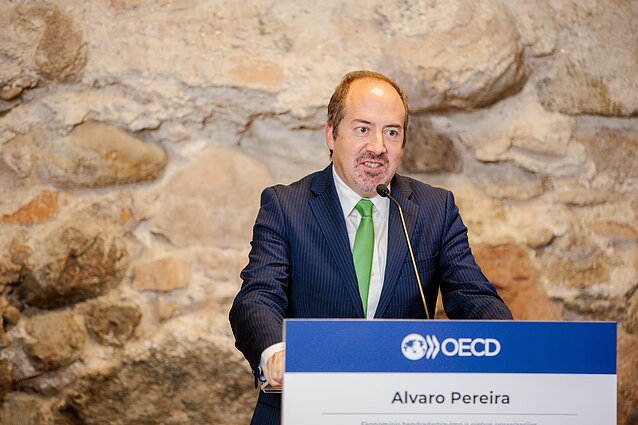
The Organization for Economic Co-operation and Development (OECD) is a global policy forum that promotes policies to preserve individual liberty and improve the economic and social well-being of people around the world. It works with over 100 countries to establish evidence-based international standards and find solutions to a range of social, economic and environmental challenges.
The latest OECD Economic Survey of Lithuania says Lithuania has been among the fastest growing OECD economies of the past decade. Strong exports and integration into global value chains helped to drive its rapid recovery from the pandemic. Now, Lithuania is impacted by the fallout from the war in Ukraine. Soaring prices for oil and gas, and to a lesser extent food and housing, pushed annual inflation above 22% in September, the second-highest level in the euro area.
Lithuania’s economy will grow approximately 1.3 percent next year, outpacing other countries, said chief economist of the OECD Alvaro Pereira, calling on the country to continue its reform efforts in order to remain competitive. “There will be a slowdown for sure but Lithuania’s economy will grow 1.3 percent [in 2023] – at a more rapid pace compared to other countries. However, this will depend on the war, on the economies of other countries. Other factors beyond Lithuania’s control will have an even stronger impact on economic slowdown,” he said during a presentation of OECD’s Economic Survey of Lithuania 2022 in Vilnius on October 20. “As far as economic reforms are concerned, Lithuania is surprising. It is resilient, therefore, our forecast [for Lithuania] is better than for other countries,” he added.
Finance Minister Gintarė Skaistė said that the government expected the economy to grow by approximately 1.5 percent in 2023. “We hope the economy will stay on the growth path and the pace of growth will reach approximately 1.5 percent,” she noted.
The OECD expects Lithuania’s gross domestic product (GDP) to grow 1.6 percent this year.
The organization estimates that the jobless rate in Lithuania will rise by 0.7 percentage points, to 6.5 percent next year, average inflation will fall to 10.4 percent from 17.6 percent, general government deficit will go down to 3.6 percent of GDP next year, from 4.2 percent projected in 2022, and general government debt will increase to 55.1 percent of GDP, from 52.8 percent.
The OECD recommends that Lithuania tighten fiscal policy at an appropriate pace to help mitigate inflationary pressures, to address problems related to population ageing, to help households and businesses cope with rising energy costs using targeted and temporary measures, and to respond to negative tendencies in the real estate market in a timely manner.



























